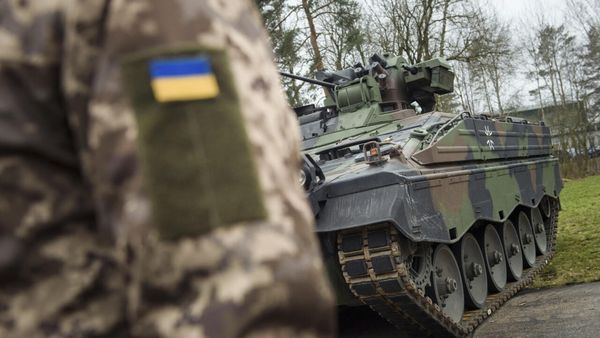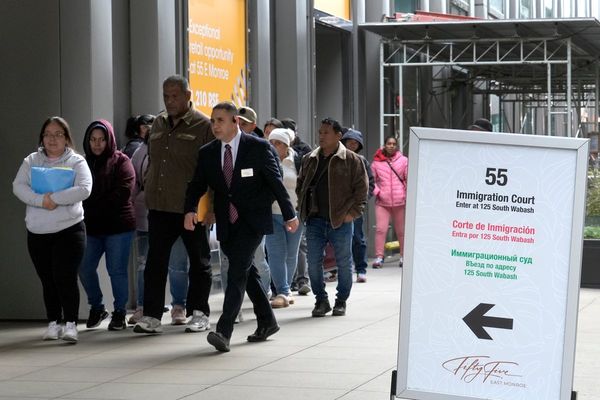
The Taliban made millions from the World Cup by providing construction equipment to build stadiums in Qatar, The Telegraph understands.
Senior Taliban officials used lucrative salaries tied to peace talks to buy and then subcontract heavy machinery for tournament infrastructure over the past decade, a source from the Taliban's Doha office revealed.
A large contingent of the Taliban leadership lived in Doha, the capital of Qatar, from 2013 onward where they were engaged in long-running peace talks with the US and UN.
“The Taliban invested heavily in the World Cup construction and the tournament was a golden duck. They were paid millions,” claimed the source, who lived in Doha in the decade running up to the Taliban takeover of Afghanistan in 2021.
“Some Taliban members had between six and ten pieces of heavy machinery each in Doha and would earn up to £10,000 per machine per month.”
Two separate senior Taliban sources described how officials were given lucrative allowances to live in the country during the peace negotiations, which was then invested in heavy construction machinery.

It is understood that the Qatari authorities – with the approval of the US and UN – paid members of the Taliban’s political office in Doha a monthly stipend worth thousands of pounds as part of efforts to help facilitate peace talks with the West. The visiting officials were also provided with luxury SUVs, free health care and regular food deliveries.
The Telegraph has been told that the money was initially paid in cash and later transferred directly into the Taliban officials’ bank accounts, making it difficult for US and Qatari authorities to track spending.
The Qataris claim the monthly payments were “monitored in coordination” with the US, “including the total amounts and how and where it was spent”.
There is no suggestion of wrongdoing, or any involvement in the Taliban construction arrangements, by the Qatari authorities.
‘Open secret’
Multiple sources allege that a Taliban middle-man living in Doha, Haji Ahmad Jan, the former minister of petroleum and mines in Afghanistan between 1996 and 2001, oversaw the leasing of machines to construction companies responsible for building the World Cup stadiums and infrastructure. Haji Ahmad Jan has been approached for comment.
“It was an open secret in the Afghan Embassy in Doha that the Taliban negotiations team and political office were being paid well by the Qatari regime and they invested these salaries in construction equipment for the World Cup,” says one former senior Afghan diplomat in Doha.
“The Taliban’s Haqqani network even used to collect money and donations from Afghans based in other Arab states and promise them the money would be invested in the Qatar World Cup projects.”
The Taliban’s alleged links to the construction of the World Cup, while not improper or illegal, raises further questions of a tournament embroiled by controversy and labour abuse allegations.

It has been reported that more than 6,000 migrant workers died while labouring on stadia and infrastructure in Qatar, which the national government denies. It instead claims that just three stadium workers have died during the 12-year period of construction.
The Taliban's presence in the nation stretches back more than a decade. In the early 2010s, many senior Taliban officials left Afghanistan for Qatar, where the militants were welcomed by the country's then-Emir, Hamad bin Khalifa al Thani.
In Afghanistan, the Taliban was waging an insurgency against former President Hamid Karzai, who was propped up by US-led coalition forces.
Oil-rich Qatar, home to fewer than three million people, had become one of the wealthiest nations in the world and was welcoming investment from across the globe. What Doha did not have, however, was geopolitical clout.
Securing the 2022 World Cup, in 2010, was a start for the country – and the Qataris saw an opportunity to further increase their international standing by stepping in after an initial round of peace negotiations broke down between the US and the Taliban in 2013.
While it worked to broker the 2020 peace agreement in Doha between the Taliban and the US, Qatar housed the Taliban leadership in properties described as “the size of small castles”.
The majority of these officials have now returned to Afghanistan, it is understood.

Since returning to power in August 2021, the Taliban have struggled politically with much of the country’s international aid withdrawn and the Afghan economy on its knees.
Senior figures have clashed over how closely the group should adhere to Sharia law and, in recent weeks, the regime has started to squeeze out the international media.
Two of the Taliban officials who provided details on their organisation’s involvement in the World Cup contacted the Telegraph independently after growing frustrated with the senior leadership implementing conservative policies in Afghanistan, despite having lived a luxurious lifestyle in Qatar.
Last week, the Taliban announced a return of brutal Sharia punishments in Afghanistan, including stonings and floggings.
Human rights groups have also documented the extrajudicial killings of hundreds of former Afghan government officials and members of the armed forces and police by the Taliban, as well as the detention of activists and journalists.
Girls have meanwhile been banned from attending secondary schools and women are forbidden from working and even using many public spaces, including parks, funfairs and gyms.
In a response to The Telegraph, a spokesperson for the Taliban said: “We reject claims about the Islamic Emirate of Afghanistan providing any construction machinery to the State of Qatar for the 2022 world cup.
“No official of the Islamic Emirate has invested any ‘lucrative’ allowances/stipends on any heavy machinery and/or sub-contracted any such machinery to any Qatari firms.”
A Qatari government official told The Telegraph: “The Taliban’s political office in Doha was established at the specific request of the US government in 2013, and in coordination with the former Afghan government, with the aim of fostering dialogue toward peace.
“The political office and its activities were monitored and engaged-with on terms agreed and coordinated with the United States. Accordingly, the United States had full visibility on all arrangements and matters with regard to hosting the Taliban political office in Qatar. Any measures taken or arrangements made were in compliance with Qatar’s obligations under international law, and under the relevant US and Qatari laws and regulations.”
The Telegraph has also contacted Fifa for comment.







